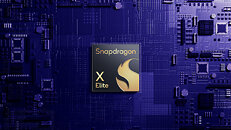- Joined
- Aug 19, 2017
- Messages
- 2,579 (0.97/day)
The recent launch of Copilot+ PCs, a collaboration between Microsoft and Qualcomm, has taken an unexpected turn in the market. While these devices were promoted for their artificial intelligence capabilities, a Bloomberg report reveals that consumers are primarily drawn to them for their impressive battery life. The Snapdragon X-powered Copilot+ PCs have made a significant impact, securing 20% of global PC sales during their launch week. However, industry analyst Avi Greengart points out that the extended battery life, not the AI features, is driving these sales. Microsoft introduced three AI-powered features exclusive to these PCs: Cocreator, Windows Studio Effects, and Live Captions with Translation. Despite these innovations, many users find these features non-essential for daily use. The delay of the anticipated Recall feature due to privacy concerns has further dampened enthusiasm for the AI aspects of these devices.
The slow reception of on-device AI capabilities extends beyond consumer preferences to the software industry. Major companies like Adobe, Salesforce, and SentinelOne declined Microsoft's request to optimize their apps for the new hardware, citing resource constraints and the limited market share of AI-capable PCs. Gregor Steward, SentinelOne's VP for AI, suggests it could take years before AI PCs are widespread enough to justify app optimization. Analysts project that by 2028, only 40% of new computers will be AI-capable. Despite these challenges, Qualcomm remains optimistic about the future of AI PCs. While the concept may currently be more on the marketing side, the introduction of Arm-based Windows laptops offers a welcome alternative to the Intel-AMD duopoly. As the technology evolves and adoption increases, on-device AI features may become more prevalent and useful. The imminent arrival of AMD Ryzen AI 300 series and Intel Lunar Lake chips promises to expand the Copilot+ PC space further. For now, however, it appears that superior battery life remains the primary selling point for consumers.

View at TechPowerUp Main Site | Source
The slow reception of on-device AI capabilities extends beyond consumer preferences to the software industry. Major companies like Adobe, Salesforce, and SentinelOne declined Microsoft's request to optimize their apps for the new hardware, citing resource constraints and the limited market share of AI-capable PCs. Gregor Steward, SentinelOne's VP for AI, suggests it could take years before AI PCs are widespread enough to justify app optimization. Analysts project that by 2028, only 40% of new computers will be AI-capable. Despite these challenges, Qualcomm remains optimistic about the future of AI PCs. While the concept may currently be more on the marketing side, the introduction of Arm-based Windows laptops offers a welcome alternative to the Intel-AMD duopoly. As the technology evolves and adoption increases, on-device AI features may become more prevalent and useful. The imminent arrival of AMD Ryzen AI 300 series and Intel Lunar Lake chips promises to expand the Copilot+ PC space further. For now, however, it appears that superior battery life remains the primary selling point for consumers.

View at TechPowerUp Main Site | Source





